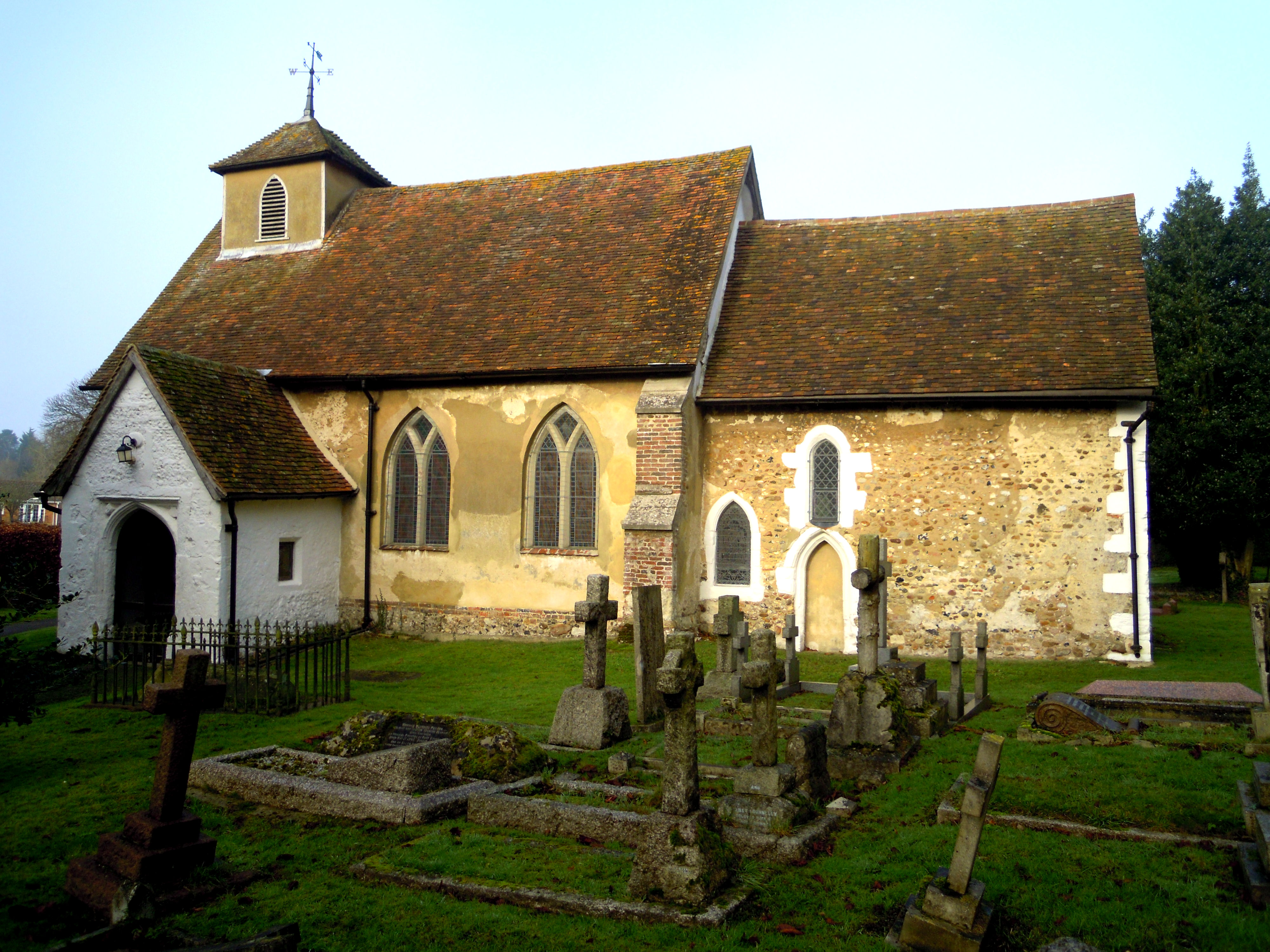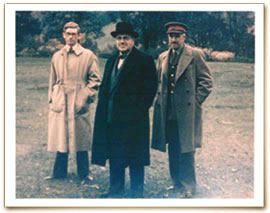|
Action This Day (memo)
Action This Day was a 1941 memorandum sent to Winston Churchill personally, to advise Churchill that the Bletchley Park (BP) codebreaking establishment was short of staff in some critical areas. Their requirements were small, but as a small (and secret) organisation their management did not have priority. Four senior heads of sections ("Huts") and their deputies wrote to Churchill, who had visited "BP" on 6 September 1941, where he made a speech saying he appreciated their work. The memo was signed by Alan Turing and Hugh Alexander (head and deputy head of Hut 8); and Gordon Welchman and Stuart Milner-Barry (head and deputy head of Hut 6). The four were known as the "Wicked Uncles". Churchill and Bletchley Park Winston Churchill had been interested in military intelligence from the First World War. He called Bletchley Park '"the geese who laid the golden eggs and never cackled". When he became Prime Minister he asked in September 1940 through his personal assistant Desmond Mor ... [...More Info...] [...Related Items...] OR: [Wikipedia] [Google] [Baidu] |
Winston Churchill
Sir Winston Leonard Spencer Churchill (30 November 187424 January 1965) was a British statesman, soldier, and writer who served as Prime Minister of the United Kingdom twice, from 1940 to 1945 Winston Churchill in the Second World War, during the Second World War, and again from 1951 to 1955. Apart from two years between 1922 and 1924, he was a Member of Parliament (United Kingdom), Member of Parliament (MP) from 1900 to 1964 and represented a total of five UK Parliament constituency, constituencies. Ideologically an Economic liberalism, economic liberal and British Empire, imperialist, he was for most of his career a member of the Conservative Party (UK), Conservative Party, which he led from 1940 to 1955. He was a member of the Liberal Party (UK), Liberal Party from 1904 to 1924. Of mixed English and American parentage, Churchill was born in Oxfordshire to Spencer family, a wealthy, aristocratic family. He joined the British Army in 1895 and saw action in British Raj, Br ... [...More Info...] [...Related Items...] OR: [Wikipedia] [Google] [Baidu] |
Hastings Ismay
Hastings Lionel Ismay, 1st Baron Ismay (21 June 1887 – 17 December 1965), was a diplomat and general in the British Indian Army who was the first Secretary General of NATO. He also was Winston Churchill's chief military assistant during the Second World War. Ismay was born in Nainital, India, in 1887, and educated in the United Kingdom at Charterhouse School and the Royal Military College, Sandhurst. After Sandhurst, he joined the Indian Army as an officer of the 21st Prince Albert Victor's Own Cavalry. During the First World War, he served with the Camel Corps in British Somaliland, where he joined in the British fight against the "Mad Mullah", Mohammed Abdullah Hassan. In 1925, Ismay became an Assistant Secretary of the Committee of Imperial Defence (CID). After being promoted to the rank of colonel, he served as the military secretary for Lord Willingdon, the Viceroy of India, then returned to the CID as Deputy Secretary in 1936. On 1 August 1938, shortly before the ... [...More Info...] [...Related Items...] OR: [Wikipedia] [Google] [Baidu] |
Parliamentary Private Secretary
A Parliamentary Private Secretary (PPS) is a Member of Parliament (MP) in the United Kingdom who acts as an unpaid assistant to a minister or shadow minister. They are selected from backbench MPs as the 'eyes and ears' of the minister in the House of Commons. PPSs are junior to Parliamentary Under-Secretaries of State, a ministerial post salaried by one or more departments. Duties and powers of a PPS Although not paid other than their salary as an MP, PPSs help the government to track backbench opinion in Parliament. They are subject to some restrictions as outlined in the Ministerial Code of the British government but are not members of the Government. A PPS can sit on select committees but must avoid "associating themselves with recommendations critical of, or embarrassing to the Government", and must not make statements or ask questions on matters affecting the minister's department. In particular, the PPS in the Department for Communities and Local Government may no ... [...More Info...] [...Related Items...] OR: [Wikipedia] [Google] [Baidu] |
George Harvie-Watt
Sir George Steven Harvie-Watt, 1st Baronet, QC, TD, DL, FRSA (23 August 1903 – 18 December 1989) was a British barrister and Conservative Party politician. Harvie-Watt studied at George Watson's College in Edinburgh, then at the University of Glasgow and the University of Edinburgh. In 1924, he was commissioned into the Territorial Army Royal Engineers. In 1930, he became a barrister at Inner Temple, while at the 1931 general election, he was elected as Member of Parliament (MP) for Keighley. He lost his seat in 1935, but re-entered Parliament by winning a by-election for the seat of Richmond (Surrey) in 1937. He immediately became Parliamentary Private Secretary to the Board of Trade, and was also promoted in the Territorial Army: to Lieutenant-Colonel in 1938, and Brigadier in 1941.The Pa ... [...More Info...] [...Related Items...] OR: [Wikipedia] [Google] [Baidu] |
Bombe
The bombe () was an electro-mechanical device used by British cryptologists to help decipher German Enigma-machine-encrypted secret messages during World War II. The US Navy and US Army later produced their own machines to the same functional specification, albeit engineered differently both from each other and from Polish and British bombes. The British bombe was developed from a device known as the " bomba" ( pl, bomba kryptologiczna), which had been designed in Poland at the Biuro Szyfrów (Cipher Bureau) by cryptologist Marian Rejewski, who had been breaking German Enigma messages for the previous seven years, using it and earlier machines. The initial design of the British bombe was produced in 1939 at the UK Government Code and Cypher School (GC&CS) at Bletchley Park by Alan Turing, with an important refinement devised in 1940 by Gordon Welchman. The engineering design and construction was the work of Harold Keen of the British Tabulating Machine Company. The first bomb ... [...More Info...] [...Related Items...] OR: [Wikipedia] [Google] [Baidu] |
WRENS
Wrens are a family of brown passerine birds in the predominantly New World family Troglodytidae. The family includes 88 species divided into 19 genera. Only the Eurasian wren occurs in the Old World, where, in Anglophone regions, it is commonly known simply as the "wren", as it is the originator of the name. The name ''wren'' has been applied to other, unrelated birds, particularly the New Zealand wrens (Acanthisittidae) and the Australian wrens (Maluridae). Most wrens are visually inconspicuous though they have loud and often complex songs. Exceptions include the relatively large members of the genus ''Campylorhynchus'', which can be quite bold in their behaviour. Wrens have short wings that are barred in most species, and they often hold their tails upright. Wrens are primarily insectivorous, eating insects, spiders and other small invertebrates, but many species also eat vegetable matter and some eat small frogs and lizards. Etymology and usage The English name "wren" derive ... [...More Info...] [...Related Items...] OR: [Wikipedia] [Google] [Baidu] |
Letchworth
Letchworth Garden City, commonly known as Letchworth, is a town in the North Hertfordshire district of Hertfordshire, England. It is noted for being the first garden city. The population at the time of the 2011 census was 33,249. Letchworth was an ancient parish, appearing in the Domesday Book of 1086. It remained a small rural village until the start of the twentieth century. The development of the modern town began in 1903, when much of the land in Letchworth and the neighbouring parishes of Willian and Norton was purchased by a company called First Garden City Limited, founded by Ebenezer Howard and his supporters with the aim of building the first "garden city", following the principles Howard had set out in his 1898 book, ''To-morrow: A Peaceful Path to Real Reform''. Their aim was to create a new type of settlement which provided jobs, services, and good housing for residents, whilst retaining the environmental quality of the countryside, in contrast to most indust ... [...More Info...] [...Related Items...] OR: [Wikipedia] [Google] [Baidu] |
British Tabulating Machine Company
__NOTOC__ The British Tabulating Machine Company (BTM) was a firm which manufactured and sold Hollerith unit record equipment and other data-processing equipment. During World War II, BTM constructed some 200 " bombes", machines used at Bletchley Park to break the German Enigma machine ciphers. The company was formed in 1902 as The Tabulator Limited, after Robert Porter obtained the rights to sell Herman Hollerith's patented machines from the US Tabulating Machine Company (later to become IBM). By 1909, the company had been renamed the "British Tabulating Machine Company Limited". In 1920, the company moved from London to Letchworth, Hertfordshire; it was also at this point that it started manufacturing its own machines, rather than simply reselling Hollerith equipment. Annual revenues were £6K in 1915, £122K in 1925, and £170K in 1937. In 1916 there were 45 staff; this increased to 132 in 1922, 326 in 1929 and 1,225 in 1939. In return for the exclusive right to market ... [...More Info...] [...Related Items...] OR: [Wikipedia] [Google] [Baidu] |
Alastair Denniston
Commander Alexander "Alastair" Guthrie Denniston (1 December 1881 – 1 January 1961) was a Scottish codebreaker in Room 40, deputy head of the Government Code and Cypher School (GC&CS) and hockey player. Denniston was appointed operational head of GC&CS in 1919 and remained so until February 1942.F. H. Hinsley, revised by Ralph Erskine, "Denniston, Alexander Guthrie lastair(1881–1961), cryptanalyst and intelligence officer", ''Oxford Dictionary of National Biography'', 2004 Early life Denniston was born in Greenock, Renfrewshire, the son of a medical practitioner. He studied at the University of Bonn and the University of Paris. Denniston was a member of the Scottish Olympic hockey team in 1908 and won a bronze medal. He played as a half-back, and his club team was listed as Edinburgh. In the IOC's official 1908 report, he is listed as Dennistoun rather than Denniston. First World War and interbellum In 1914 Denniston helped form Room 40 in the Admiralty, an organisat ... [...More Info...] [...Related Items...] OR: [Wikipedia] [Google] [Baidu] |
John Herivel
John is a common English name and surname: * John (given name) * John (surname) John may also refer to: New Testament Works * Gospel of John, a title often shortened to John * First Epistle of John, often shortened to 1 John * Second Epistle of John, often shortened to 2 John * Third Epistle of John, often shortened to 3 John People * John the Baptist (died c. AD 30), regarded as a prophet and the forerunner of Jesus Christ * John the Apostle (lived c. AD 30), one of the twelve apostles of Jesus * John the Evangelist, assigned author of the Fourth Gospel, once identified with the Apostle * John of Patmos, also known as John the Divine or John the Revelator, the author of the Book of Revelation, once identified with the Apostle * John the Presbyter, a figure either identified with or distinguished from the Apostle, the Evangelist and John of Patmos Other people with the given name Religious figures * John, father of Andrew the Apostle and Saint Peter * Pope ... [...More Info...] [...Related Items...] OR: [Wikipedia] [Google] [Baidu] |
Edward Travis
Sir Edward Wilfred Harry Travis (24 September 1888 – 23 April 1956) was a British cryptographer and intelligence officer, becoming the operational head of Bletchley Park during World War II, and later the head of GCHQ. Career Educated locally in Blackheath, Travis joined the Royal Navy in 1906 as a Paymaster officer, and served on HMS ''Iron Duke''. From 1916 to 1918, he worked on Navy cyphers. He retired in the 1920s, having reached the rank of Paymaster Commander. By 1925, he was in charge of security at the Government Code and Cypher School (GC&CS) and deputy to Alastair Denniston. Travis replaced Denniston as the operational head of Bletchley Park in February 1942, although both took the title of Deputy Director. This may have happened because in October 1941 four senior cryptanalysts, Alan Turing, Gordon Welchman, Conel Hugh O'Donel Alexander, and Stuart Milner-Barry had written directly to Churchill, over the head of Denniston, to alert Churchill to the fact that a sho ... [...More Info...] [...Related Items...] OR: [Wikipedia] [Google] [Baidu] |






